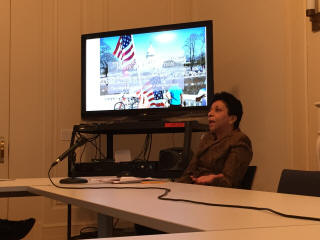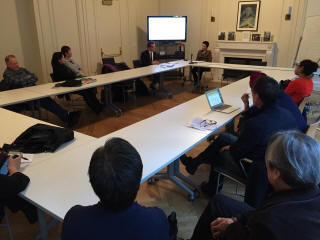Date: Wednesday, February 4, 2015
Time: 3:30PM to 5:30PM
Place: Roosevelt House – Hunter College/CUNY
47-49 East 65th Street,- 2nd Fl Meeting Room, Manhattan

Speaker: Dr. Prema Kurien, CUNY Thomas Tam Visiting Professor and Professor of Sociology, Syracuse University
Discussant: Dr. Kenneth Guest, Baruch College/CUNY
Dr. Prema Kurien will discuss differences in the civic and political activism patterns of Sikhs in Canada and the United States. Dr. Kurien’s talk draws on an ongoing research project examining how differences in the social, political, and religious opportunity structures of Canada and the United States, as well as the characteristics of groups, shape the political incorporation of religious minorities. South Asians comprise the largest “visible minority group” in Canada. Her main focus is on Sikhs and Hindus (from India, Sri Lanka, and the Indian diaspora in the Caribbean) since they manifest interesting differences in political mobilization within Canada and the United States and between the two countries. She is conducting research for this project in Toronto, Vancouver, New York, and Northern California through interviews and some field research, analyses of information regarding the advocacy organizations as well as the media coverage of the groups in the two countries.

Some questions that have come up during the course of this research that will be addressed in her presentation include:
- What are the factors that give rise to political mobilization among contemporary ethnic groups? Sikhs in Canada have been described as a “politically plugged-in community.” Why are Sikhs so politically active and represented in elected positions in Canada compared to most other visible minority groups?
- How do national political opportunity structures affect civic engagement patterns? Why have Sikhs in the US mobilized around national organizations with paid staff members targeting US policy makers, while Sikhs in Canada have done so around smaller, local, volunteer based organizations, largely serving the community?
- What role do transnational events play in influencing patterns of activism in North American public spheres? Contrary to the literature arguing that transnational involvements are rarely sustained in the second generation, many second-generation Sikhs in North America closely monitor events in India and mobilize around perceived injustices against Sikhs there.
- In interviews, the September 11, 2001 attacks in the US and the 1985 bombing of an Air India aircraft that took off from Canada were repeatedly mentioned as watershed events for Sikhs that spurred mobilization. What larger lessons can we learn about the role that key historical events play in shaping the political opportunity structures of countries?
Co-Sponsor
Mapping of Asian Americans in New York (MAANY)
